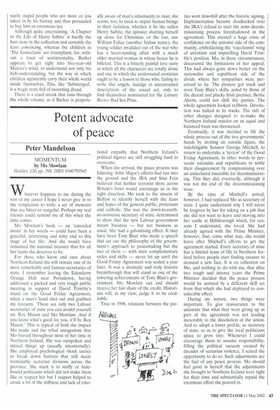Potent advocate of peace
Peter Mandelson
MOMENTUM by Mo Mowlam
Hodder, #20, pp. 398, ISBN 0340793945
Whatever happens to me during the rest of my career I hope I never give in to the temptation to write a set of memoirs that are bitter or vengeful. Perhaps my real friends could remind me of this when the time comes.
Mo Mowlam's book — an 'extended moan' in her words — could have been a graceful, interesting and witty end to this stage of her life. And she would have remained the national treasure that for all her faults she deserves to be.
For those who know and care about Northern Ireland she will remain one of its most remarkable and famous secretaries of state. I remember leaving the Edenderry Orange Hall near Portadown, having addressed a packed and very rough public meeting in support of David Trimble's stand on the Good Friday Agreement, when a man's hand shot out and grabbed my forearm. 'There are only two Labour secretaries of state you can model yourself on. Roy Mason and Mo Mowlam, And if you know what's good for you, it'll be Roy Mason.' This is typical of both the impact Mo made and the tribal antagonism that Mo braved throughout most of her time in Northern Ireland. She was outspoken and stirred things up (usually intentionally). She employed psychological shock tactics to break down barriers that still made formidable sectarian divisions across the province. She stuck it to stuffy or hidebound politicians which did not make them like or respect her but I suspect helped to erode a bit of the stiffness and lack of emo
tional empathy that Northern Ireland's political figures are still struggling hard to overcome.
When she arrived, the peace process was faltering: John Major's efforts had run into the ground and the IRA and Sinn Fein believed that further terrorist shots across Britain's bows would encourage us in the right direction. Mo took to the streets of Belfast to identify herself with the fears and hopes of the general public, protestant and catholic. She was the down-to-earth, no-nonsense secretary of state, determined to show that the new Labour government meant business — but not business as usual. She had a galvanising effect. It may have been Tony Blair who made a speech that set out the philosophy of the government's approach to peacemaking but the two of them — with their complementary styles and skills — never let up until the Good Friday Agreement was sealed a year later, It was a dramatic and truly historic breakthrough that will stand as one of the towering achievements of Tony Blair's government. Mo Mowlam can and should receive her fair share of the credit. Historians will, in my view, judge it to be creditable.
True in 1998, relations between the par
ties went downhill after the historic signing. Implementation became deadlocked over the IRA's refusal to start the arms decommissioning process foreshadowed in the agreement. This created a huge crisis of confidence on the unionist side of the community, emboldening the 'rejectionisf wing of unionism and imperilling David Trimble's position. Mo, in these circumstances, discovered the limitations of her appeal. This had always gone down better on the nationalist and republican side of the divide where her sympathies were perceived to lie. The process got stuck and even Tony Blair's skills, aided by those of the decent and plucky Irish premier, Bertie Ahern, could not shift the parties. The whole agreement looked stillborn. Devolution was halted in its tracks. The raft of other changes designed to re-make the Northern Ireland statelet on an equal and balanced basis was threatened.
Eventually, it was decided to lift the whole process out of the two governments' hands by inviting an outside figure, the indefatigable Senator George Mitchell, to return to undertake a 'review' of the Good Friday Agreement, in other words to persuade unionists and republicans to settle their disagreement by compromising over an undeclared timetable for decommissioning. This they did, eventually, although it was not the end of the decommissioning issue.
By the time of Mitchell's arrival, however, I had replaced Mo as secretary of state. I quite understand why I will never be forgiven by her for taking on a job that she did not want to leave and moving into her castle at Hillsborough which, for reasons I understand, she loved, She had already agreed with the Prime Minister, however, that, come what may, she would leave after Mitchell's efforts to get the agreement started. Every secretary of state has a limited lease of life in Northern Ireland before people start finding excuses to demand a new face. It is no reflection on Mo, and nothing to do with me, that after two tough and intense years the Prime Minister decided that the peace process would be assisted by a different skill set from that which she had deployed to considerable effect.
During my tenure, two things were important. To give reassurance to the unionists that what they were giving up as part of the agreement was not leading inexorably to the dissolution of the union. And to adopt a lower profile, as secretary of state, so as to give the local politicians space to grow into. Whenever I could encourage them to assume responsibility, filling the political vacuum created by decades of sectarian violence, I seized the opportunity to do so. Such adjustments are the fuel of any peace process. Mo should feel good in herself that the adjustments she brought to Northern Ireland were right for their time and substantially repaid the enormous effort she poured in,






































































 Previous page
Previous page